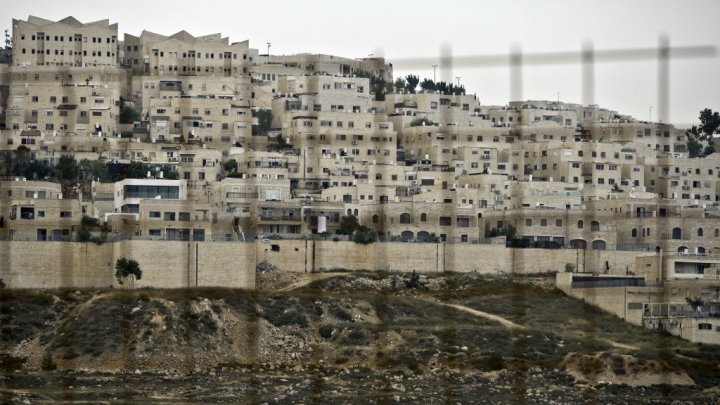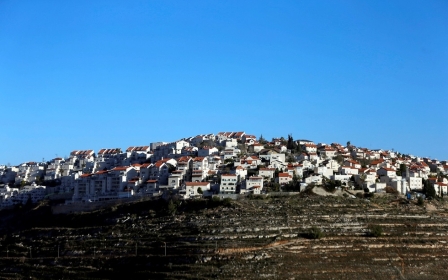British MPs demand immediate freeze on Israeli settlements

British MPs unaminously passed a motion to condemn Israeli settlement building on Thursday, warning that settlement expansion is making a two-state solution ever less likely and urging the UK government to take action to prevent a "catastrophe".
In an often heated debate that lasted over two hours, in which the deputy speaker was forced to discipline MPs for shouting over each other, the motion faced stiff opposition from both Labour and Conservative politicians.
The debate came amid a renewed flare-up of violence in the region, with a Palestinian man stabbing and shooting at random in a crowd of people at a market in the Israeli town of Petah Tikva, close to Tel Aviv.
At least four people were taken to hospital with wounds described as less than life-threatening, while the Palestinian man - an 18-year-old from the West Bank town of Nablus - was arrested.
Two Palestinians were also reportedly killed early on Thursday morning in an attack on a commercial tunnel between Egypt and the Gaza Strip - however, the Israeli military denies launching any attacks in the area overnight.
We are dealing with a catastrophe in the form of settlements
- Crispin Blunt, Conservative MP
The motion passed by the UK parliament condemned Israeli settlement building as "contrary to international law," and welcomed a UN resolution passed in December 2016 – the first UN Security Council resolution to specifically address Israeli settlements since 1980 – which described settlements as a "flagrant violation" of international law.
A wide-ranging debate before the vote, however, frequently strayed onto more general topics such as the bases of the Israeli-Palestinian conflict and other current barriers to peace.
The majority of participating MPs declared that they had recently been on trips to Israel or the West Bank, most sponsored either by Labour Friends of Israel or Fatah UK.
Speaking against the motion, Conservative MP John Howell said that what is needed is not the "internationalisation" of the settlements issue through foreign criticism, but direct peace talks between the Israelis and Palestinians without pre-conditions.
"Unfortunately, the Palestinian side comes up with pre-conditions every time," he said. "And those pre-conditions usually involve the release of yet more terrorists."
Howell praised Israel for previously imposing a 10-month moratorium on settlement building and offering to withdraw from areas of the West Bank, but said the Palestinians had failed to take advantage of these opportunities.
Does anybody seriously believe that the settlements are a bigger barrier to peace than Hamas’s terrorism and extremism?
- Ian Austin, Labour MP
He also warned that, when Palestinian elections are held, the Palestinian Authority will be succeeded by "organisations that are in favour of ISIS".
Labour MP Ian Austin joined his Conservative colleague in condemning the motion, which he called "one-sided" and simplistic.
"It’s not the case that settlements make a two-state solution impossible," he told the House of Commons.
"Does anybody seriously believe that the settlements are a bigger barrier to peace than Hamas’s terrorism and extremism?"
Labour MP Joan Ryan also criticised the motion for not referring to other factors that damage trust between Israel and the Palestinians, which she said included "anti-Semitic incitement" by the Palestinian Authority, the naming of schools after "so-called martyrs" and the insistence of the right to return for descendants of Palestinian refugees to pre-1967 Israeli territory.
She also said that trust had been depleted by "the experience of Gaza, which Israel unilaterally withdrew from Gaza 12 years ago, only to see it come under the control of Hamas."
Criticism of UK government policy
Supporters of the motion stressed that, while settlements are not the only barrier to peace, they make it geographically impossible to create a contiguous and uninterrupted Palestinian state.
They also stressed that the UK, as a strong historical ally of Israel, has a duty to comment on domestic policy that could harm the prospects for peace in the region.
Conservative MP Crispin Blunt, chair of the foreign affairs select committee, said that "friends do not allow each other to make profound and damaging mistakes."
He also criticised his own government, saying: "It distresses me that recent signals from the (UK) government – briefing against the Kerry speech, not participating in the Paris conference - suggests that it doesn’t fully appreciate the seriousness of this obstacle to peace.
"We are dealing with a catastrophe in the form of settlements," he said.
Blunt and other MPs drew attention to a vote in the Israeli parliament on Monday that retrospectively approved thousands of settlement houses built on private Palestinian land, in violation of international law.
"Parliaments can’t make legal what international law proscribes," Blunt stressed.
The British government has already condemned the new law, with Middle East minister Tobias Ellwood saying on Tuesday: "It is of great concern that the bill paves the way for significant growth in settlements in the West Bank, threatening the viability of the two-state solution."
The law – which the Israeli attorney general says is unconstitutional and could be repealed – has also been condemned by the UN, which said it "crossed a very thick red line".
Stay informed with MEE's newsletters
Sign up to get the latest alerts, insights and analysis, starting with Turkey Unpacked
Middle East Eye delivers independent and unrivalled coverage and analysis of the Middle East, North Africa and beyond. To learn more about republishing this content and the associated fees, please fill out this form. More about MEE can be found here.




